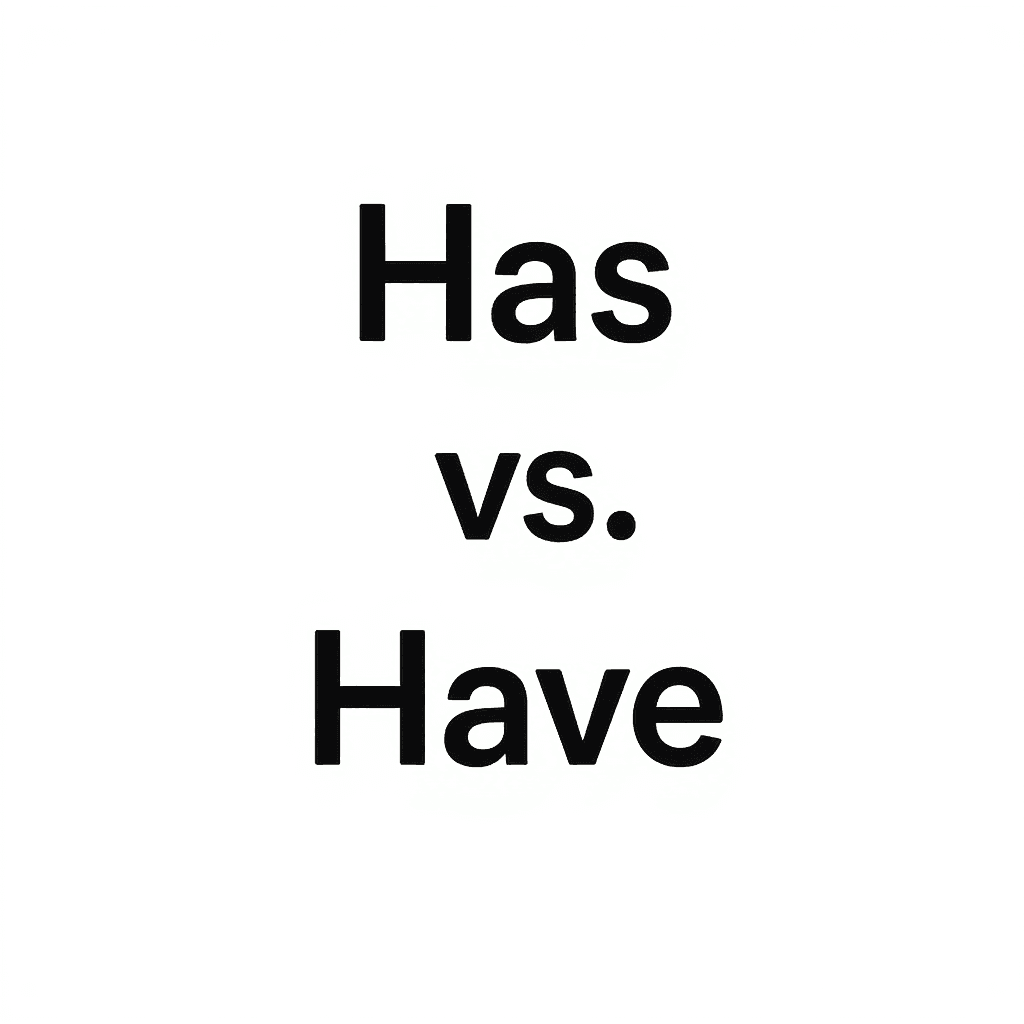“Has” vs. “Have”: What’s the Difference?
 Both has and have come from the verb to have, which means to own, to hold, or to experience.
Both has and have come from the verb to have, which means to own, to hold, or to experience.
The difference depends on the subject — who or what is doing the action.
Has: Used with He, She, It (and Singular Nouns)
Meaning
Use “has” when talking about a single person, animal, or thing in the present tense.
Examples of “Has” (10 total)
- She has a new car.
- He has two sisters.
- My dog has a shiny coat.
- The teacher has a big classroom.
- It has been a long day.
- The company has strict rules.
- That book has an interesting story.
- The computer has stopped working.
- A cat has nine lives.
- Everyone has dreams.
🧠 Tip:
If the subject is he, she, it, or a single noun, use has.
Have: Used with I, You, We, They (and Plural Nouns)
Meaning
Use “have” when the subject is I, you, we, they, or any plural noun.
It’s also used for questions and negative sentences.
Examples of “Have” (10 total)
- I have a lot of work today.
- You have a great sense of humor.
- We have two dogs.
- They have been friends for years.
- I have no idea what happened.
- The students have their own lockers.
- You have a good memory.
- We have tickets to the concert.
- They have already finished their homework.
- I have something to tell you.
🧠 Tip:
If the subject is I, you, we, or they, use have.
Quick Comparison Table
| Subject | Correct Form | Example |
|---|---|---|
| I | have | I have a question. |
| You | have | You have a nice smile. |
| He / She / It | has | She has a cat. |
| We | have | We have time to spare. |
| They | have | They have two kids. |
| Singular Noun | has | The dog has a toy. |
| Plural Noun | have | The dogs have toys. |
Special Note: Questions and Negatives
When you make a question or negative sentence, use have with all subjects — even he, she, it.
- Does he have a car? (not “Has he a car?”)
- He doesn’t have a car.
- Do they have time?
- They don’t have any pets.
How to Remember the Difference
👉 Has = He / She / It (singular)
👉 Have = I / You / We / They (plural)
💡 Memory Trick:
“She has,” “They have.”
Small word = single person. Big word = many people.
Why AI Often Mixes Them Up
Because has and have depend on context, even AI tools sometimes choose the wrong form.
Humanizey helps fix grammar and tense confusion automatically, so your AI-written text always sounds natural and human.
FAQs
1. Do we say “He have” or “He has”?
Always he has — because “he” is singular.
2. What about “I has”?
Never correct. Say I have.
3. Can “has” be used in questions?
Yes, but only in formal English: Has she finished her work?
In everyday English, we use Does she have…?
4. What’s the past tense of both?
The past tense for both has and have is had.
Example: I had a bike when I was a kid.
Practice: Choose the Correct Word (“Has” or “Have”)
(Answers are listed at the end.)
- She ___ a beautiful smile.
- I ___ two brothers.
- The dog ___ a red collar.
- You ___ been very kind.
- He ___ already left for school.
- They ___ a new apartment.
- We ___ not seen that movie yet.
- My phone ___ a cracked screen.
- It ___ started raining.
- I ___ something important to say.
Answers
- has
- have
- has
- have
- has
- have
- have
- has
- has
- have
